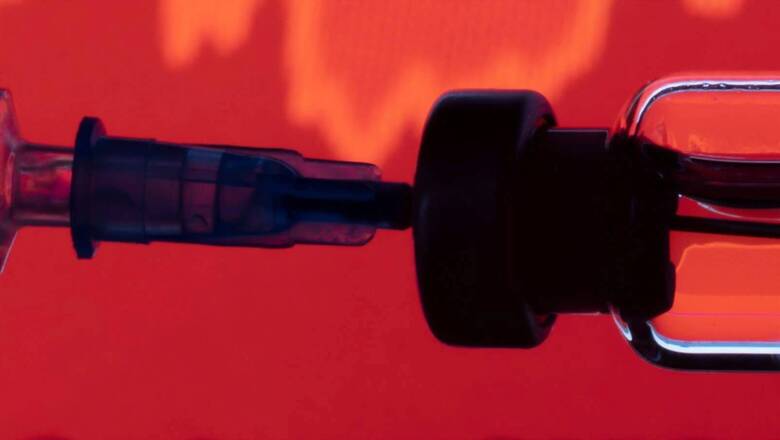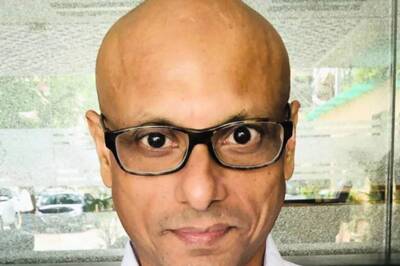
views
Soon after delta variant-driven waves in many countries, there’s a new variant of the novel coronavirus causing global panic. After WHO notified the omicron variant of the coronavirus, countries introduced travel bans and restrictions once again. Many fear that the new variant could spread quickly even among vaccinated populations.
FOLLOW | Coronavirus LIVE Updates: 4 from British Airways Flight Test Covid +ve in Delhi; Nigeria, Saudi Confirm 1st Omicron Cases
But South Africa has had to deal with the brunt of the discovery firsthand after scientists in the country detected the new variant little over a week ago. Head of science at one of South Africa’s biggest private laboratories, Raquel Viana got the shock of her life on November 19. She was sequencing the genes on eight coronavirus samples in the Lancet lab, when she realised there were a a large number of mutations on the samples, especially on the spike protein that the virus uses to enter human cells.
“I was quite shocked at what I was seeing. I questioned whether something had gone wrong in the process,” Viana said, adding that she experienced “a sinking feeling that the samples were going to have huge ramifications”.
She quickly called a colleague at the National Institute for Communicable Diseases (NICD) in Johannesburg, gene sequencer Daniel Amoako. “I didn’t quite know how to break it to them,” she said. She told Amoako, “To me, it looks like a new lineage.”
EXPLAINED | If Sars-CoV-2 Variants Are Nothing Out Of The Blue, Then Why Is Omicron Raising Red Flags?
With the discovery of the new variant, it is important to note that South Africa is only 25 per cent vaccinated against Covid-19. Only 7 per cent of the African continent is inoculated, and there are some African countries where not even 5 per cent of the population has received a Covid-19 vaccine.
Amoako and the team at the NICD also tested the eight samples sent by Viana, all of which had the same mutations. The situation was so bizarre that the team thought it must be a mistake. But then they remembered that there had been a sharp rise in Covid-19 infections, which might indicate a new mutant.
Around the same time that the samples were flagged by Viana, doctors saw many cases of people complaining of headaches and fatigue. After that, new Covid-19 cases were detected weeks after the delta variant had wreaked havoc in Pretoria and Johannesburg in July. The omicron variant is now the dominant strain in South Africa. But by Tuesday, apart from panic and a market meltdown, the new variant the discovery has already been detected in 15 other countries.
Earlier this month, a colleague had also alerted Viana to an oddity in the sample — an S-gene was missing. This is one of the mutations distinguishing the new omicron variant from the delta variant. Another scientist, Josie Everatt said, “The only common variant with that feature was alpha and we hadn’t seen it (in South Africa) since August,” adding, “it was scary.”
According to a report in Bloomberg, junior Lancet scientist Alicia Vermeulen was credited with making the initial find on the afternoon of November 4, when she noticed an anomaly in a single positive test. The same anomaly was then picked up several times over the week.
By November 22, the NICD and Lancet were able to determine a new variant, initially known as B.1.1.529. The S-gene could not be detected as it had mutated. On November 24, NICD officials notified the World Health Organization, following which an advisory panel classified omicron as a highly transmissible variant of concern.
The NICD also entered the data into the GISAID global science database, and found that Botswana and Hong Kong had also reported cases with the same gene sequence. “Thanks to omicron, South Africa’s daily Covid-19 infection rate is expected to quadruple to more than 10,000 by the end of this week,” said Salim Abdool Karim, one of the country’s leading infectious disease specialists.
South Africa’s take on the discovery
Seeing as only a quarter of South Africa’s population is vaccinated against Covid-19, president Cyril Ramaphosa is considering introducing mandatory vaccination. The country has a total of 3 million Covid-19 infections and over 89,000 deaths.
But there is, however, much anger against the foreign travel bans, and some of it is also directed towards the scientists. Many of them have received angry messages as well as hate mail, asking them to “stop looking” for new variants.
According to a report in the BBC, South Africa’s foreign ministry has made a statement that the country is “being punished instead of being applauded” for the discovery of omicron. Countries around the world have restricted travel from South Africa as details of the spread emerged.
The report quoted the statement by the South African foreign ministry, strongly criticising the travel bans. “Excellent science should be applauded and not punished,” it said. The bans were “akin to punishing South Africa for its advanced genomic sequencing and the ability to detect new variants quicker”, the report said.
An African Union official told the BBC that developed countries were to blame for the emergence of the variant. “What is going on right now is inevitable, it’s a result of the world’s failure to vaccinate in an equitable, urgent and speedy manner. It is as a result of hoarding [of vaccines] by high-income countries of the world, and quite frankly it is unacceptable,” the BBC report quoted AU (African Union) vaccine delivery alliance co-chair Ayoade Alakija as saying.
Wolfgang Preiser, a virologist at Stellenbosch University working on Covid-19, has received hate mail. But he is worried that other countries might take this whole saga as a lesson not to be so transparent. “It might encourage other countries to hide things, or rather, just not to look,” he said.
What happens next
There are, however, important questions to be answered. The first is how good is the new variant at evading immunity from vaccines or past illness. Others could based on how severe the symptoms will be as compared with previous variants, and how it will affect different age groups.
Scientists working on these questions will be ready with answers in another three to four weeks. Meanwhile, the new variant is said to be carrying numerous spike mutations. It is also reportedly affecting people in the under 25 age group. Regarding the affected group, South Africa’s health minister Joe Phaahla said: “They are at great risk,” Times Live reported.
Scientists said the dozens of mutations carried by the variant are expected to change the way the virus behaves. While Covid antibodies latch onto one of the three sites on the virus, these are all mutated in the new variant. This means, scientists added, that antibodies from vaccination or even previous illness could be less effective.
In India, too, former Indian Council of Medical Research (ICMR) scientist Dr Raman Gangakhedkar said vaccines might provide only partial protection against the new “heavily mutated” variant of SARS-CoV-2.
The epidemiologist, who was the face of India’s apex medical research agency during government briefings on Covid-19 last year, said the surveillance of the new variant will not be difficult if the government intensifies testing, tracing, tracking and isolation.
Dr Gangakhedkar said the public had an important role to play by following basic rules of wearing masks, maintaining hand hygiene and social distancing. “Omicron is going to hunt all those down who are vulnerable or non-vaccinated,” he said.
The WHO has also warned of “very high” risk when it comes to the new variant. It called omicron “highly divergent variant with a high number of mutations… some of which are concerning and may be associated with immune escape potential and higher transmissibility.”
(With inputs from Reuters and other agencies)
Read all the Latest News here




















Comments
0 comment